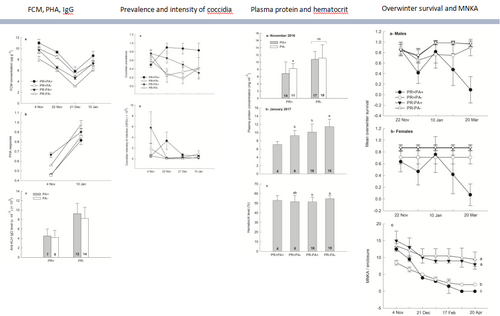Predators and parasites have been important extrinsic factors influencing the fluctuation of small mammal populations. They can have non-additive effects on a shared group of preys or hosts, which can have important consequences for population dynamics. However, experimental studies incorporating the interactions between predation and parasites are scarce in small mammal populations. Here we systematically examined the synergistic effects of predators and coccidian parasites interaction on overwinter survival and likely mechanisms underlying the synergistic effects in the root vole (Microtus oeconomus). Our aim was to test the general hypothesis that predators and coccidia interact synergistically to decrease overwinter survival of root voles through mediating vole’s physiological traits and body conditions. We carried out a factorial experimental design, by which we manipulated the predator exclusion in combination with the parasitic removal in enclosures, and then measured fecal corticosterone metabolite (FCM) levels, immunocompetence, and body conditions in captured animals via repeated live trapping. We found a strong negative synergistic effect of predators and coccidia on survival. Importantly, we found that predators increased both the prevalence and intensity of coccidian infection in voles through immune suppression induced by predation stress, while increased coccidian infection reduced plasma protein and hematocrit level of voles, which may impair anti-predator ability of voles and lead to an increase in predation. Our finding showed when voles are exposed to both predation risk and infection, their synergistic effects greatly reduce overwinter survival and population density. This may be an important mechanism influencing population dynamics in small mammals.
“Synergistic effects of predation and parasites on the overwinter survival of root voles”was published in Oecologia on July22, 2019.Doctoral candidate shang guozhen was the first author of the paper, and researcher jiang yuanhui and professor wu yan were corresponding authors. The research was supported by the national key research and development program (2016YFC0501901), the strategic pilot research program of the Chinese Academy of Sciences (XDA2005010406), and the general program of the China natural science foundation (31570421).The discipline group relies on the key laboratory of plateau adaptation and evolution of Chinese Academy of Sciences and Qinghai key laboratory of animal ecological genomics.
Paper link: https://doi.org/10.1007/s00442-019-04455-4

Schematic diagram of the mechanism of predation and parasite on overwintering survival of root vole
